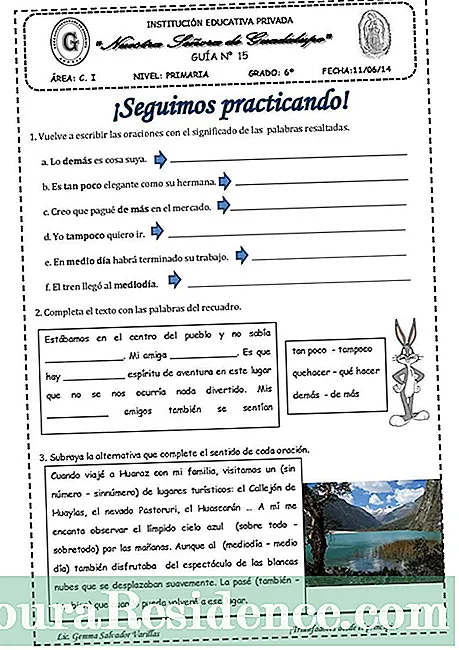
Content
- Examples of declarative statements
- Other types of statements
- Characteristics of declarative statements
The declarative statements They constitute a category of sentences that aim to affirm something clearly and objectively. What is affirmed can be a fact of the surrounding reality, an intention, a project or a fact. For example: Tomorrow is my mother's birthday.
The criterion of objectivity is not related to the veracity of what is declared, that is, what is affirmed should not necessarily be true, it should only be presented as a statement. The important thing is that the sentence affirms or denies something. For example: Tomorrow the world will end. It is a declarative statement since it affirms something, regardless of whether or not what is affirmed is true.
The latter is made explicit because formally, declarative statements can be seen as those in which the only specific objective pursued is to inform, to make known.
It can help you: Statements, Types of sentences
Examples of declarative statements
- I'll be there first thing tomorrow morning.
- After that goal, the game did not change and the result did not change.
- The 2002 vacations were the best of my life.
- On Thursday the band will perform in the central square of the town.
- The elections will be held next Sunday.
- Before you came, everything was better.
- When it rains, it is better to take off the clothes.
- My mother cooks the best pasta I have ever tasted.
- Snowfall will last throughout the winter.
- The hospital was opened at the turn of the century and little money has been invested in its care since then.
- Before the war, Paraguay was a military and technical power in the region.
- In both addition and multiplication, the order of the factors does not alter the product.
- Such was the disorder that the police had to intervene.
- I need a person to help me at home.
- Eight hours of sleep is necessary for the maintenance of good health.
- I did not expect her to return to the theater as splendid as she looks.
- The benefits of buying this product make the price look ridiculous.
- Meanwhile, the young man was still waiting by the phone.
- The tea they sell in Chinatown is the best in town.
- Dancing that music produces very pleasant sensations.
Other types of statements
Declarative statements are opposed to other categories such as:
- Exclamatory. They affirm an idea with emphasis. For example: I'm hungry!
- Interrogatives. They pose a question and therefore expect an answer from the interlocutor (unless it is a rhetorical question). For example: How much does this chair cost?
- Exhortative. Also called "imperatives", they have the objective of convincing, suggesting or imposing. For example: Take care when you walk in that area.
- Wishful thinking. They express a wish. For example: I hope the sun rises tomorrow.
Characteristics of declarative statements
- Having linguistic skills and a minimum knowledge of contextual reality is enough to understand a declarative statement.
- Many times it falls into the error of believing that all declarative statements must be formulated in the present, specifically in a timeless present, as occurs with physical laws, for example: The water boils at 100 ° C.Although this is a declarative statement, others built in the past can also be (for example: Yesterday it was very cold) or future (for example: They will sell everything they have to pay the debt).
- What the declarative statement asserts need not be something permanent. Even sentences in conditional tenses or in the subjunctive mood can be declarative statements, with the only requirement that the contribution of information be the sole intention of the speaker.
- Declarative sentences occupy most of our language and cross all discursive genres: surely they are more present in those that involve less interpersonal relationships and the search for reaction in the receiver. Thus, a random statement is more likely to be declarative in a biology book or newspaper than in a play.
See also: Declarative sentences


